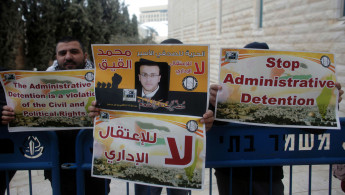Imprisoned Mohammed al-Qiq loses ability to speak and hear
Following a visit to Israeli HaEmek hospital in Afula, Jawad Boulos, who is also Qiq's lawyer, described his client's health state as gravely deteriorating.
"Qiq has lost his ability to speak and hear, and he suffers from severe pain in his muscles," Boulos said.
A further report by the hospital confirms that Qiq is now communicating through signs.
Boulos's concerns were echoed by the International Committee of the Red Cross said on Thursday.
"Mr Qiq has been on hunger strike for more than 60 days and has entered a critical stage, his life being at risk," the ICRC said in a statement.
It called for his Israeli captors and Qiq himself "to find a solution that will avoid any loss of life."
The European Union on Wednesday said it was "especially concerned" about Qiq's deteriorating health.
Qiq, a 33-year-old father of two and a correspondent for Saudi Arabia's al-Majd TV network, was arrested on November 21 at his home in the West Bank city of Ramallah.
He is being held under Israel's controversial administrative detention law, which allows the state to hold suspects for renewable six-month periods without trial - a policy that has been condemned by human rights advocates.
He has been refusing food since November 25 in protest against the "torture and ill treatment that he was subjected to during interrogation", according to Addameer, a Palestinian human rights organisation.
He has appealed against his internment but Israel's Supreme Court on Wednesday refused to order his release although it said it would follow his health on a daily basis.
Al-Qid's family fears that Israel might use a controversial Israeli law passed in July allows the force-feeding of prisoners in certain circumstances.
Over the weekend, human rights group Amnesty International called on Israeli authorities to immediately cease all non-consensual medical treatment and other punitive measures against Qiq.
The London-based group said that authorities had undertaken a number of measures aimed at pressuring him to end the hunger strike, some of which violated the prohibition of torture and other ill-treatment.
"Mohammed has forcibly received intravenous drugs which we fear prelude force-feeding attempts," Mohammed's wife Faihaa Shalash told The New Arab.
Shin Bet, the Israeli domestic security service, says Qiq was arrested for "terror activity" as part of the Islamist group Hamas, which controls the Gaza Strip.
However, his wife says he is being wrongfully detained.
"Mohammed is a Palestinian journalist who was only covering the situation in the West Bank and he was arrested because of it," said al-Qiq's wife.
Qiq was jailed for a month in 2003 and then for 13 months in 2004 for Hamas-related activities.
In 2008, he was sentenced to 16 months on charges linked to his activities on the student council at the West Bank's Birzeit University.
Palestinian prisoner Mohammed Allan, 31, ended a two-month hunger strike in August last year after his detention was suspended.
With agencies.





 Follow the Middle East's top stories in English at The New Arab on Google News
Follow the Middle East's top stories in English at The New Arab on Google News
![Israeli forces ordered bombed Gaza's Jabalia, ordering residents to leave [Getty]](/sites/default/files/styles/image_330x185/public/2176418030.jpeg?h=a5f2f23a&itok=_YGZaP1z)

